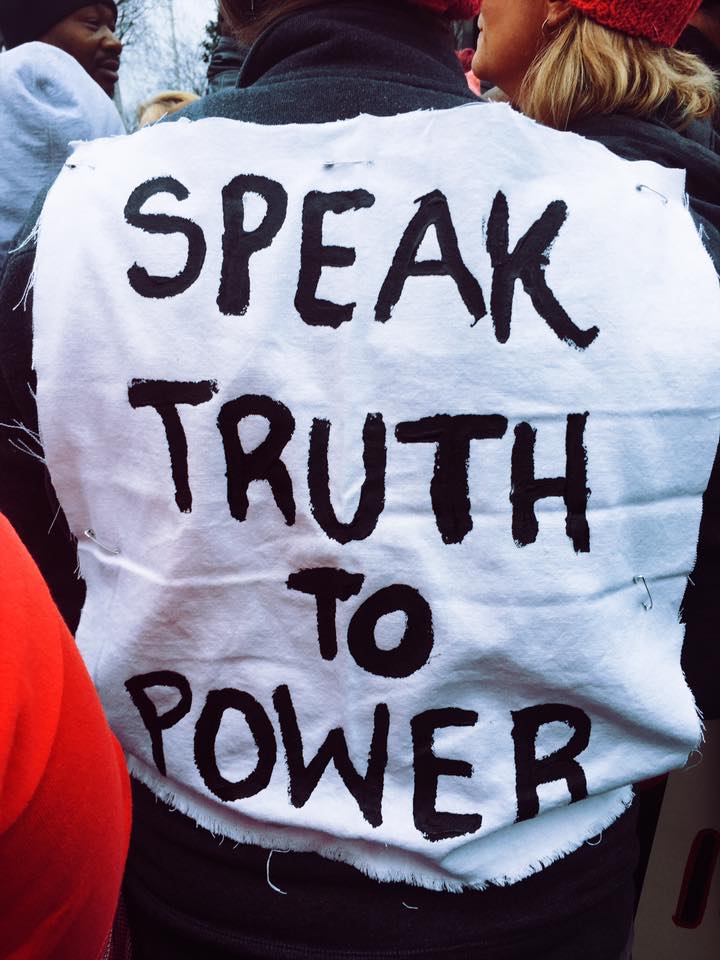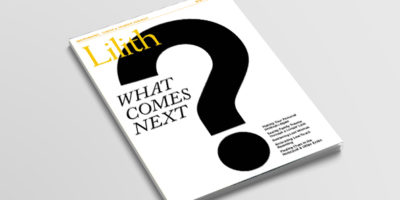
At Columbus Circle, January 19, 2017
I fly through midtown, past rows of cops. There is a whole wall of them in front of Trump Tower, and I stop to scan the building, which curves like a black fang all the way up to the jet-black stratosphere. The light around me is blurry, thick with smoke. The streets are studded with Bergdorf Goodman, Gucci, and Cartier shops – all with delicate window displays set with plastic jungle vistas, featuring lidded gold baubles opened just wide enough to reveal the diamonds within.
This is the world of the man who they thought would stop the rich from taking everything from them, I catch myself thinking, then stop myself. Repetitive Trump-thoughts, uttered thousands of times since the election by the liberal community, will be of no help now; I think we are beyond the time for shock and denial, though some amount of it is inevitable, and probably always will be.
I make it to the Columbus Circle protest a little after eight o’clock. Mayor De Blasio set it up just two nights ago, and I decided to leave Barnard College right after I finished my last class of the day – playwriting – to catch the end of it. The Women’s Marches are planned for two days from now, but since the inauguration in the next day, it seems appropriate that something would be happening in preparation.
By the time I arrive, there seems to be no way into the crowded sea of people front of Trump Hotel. I decide instead to wander down into Central Park, where a moderately sized crowd stands silently, gazing up at the stage. It is the quietest protest I’d ever been to; everyone is trying to understand the speeches, which boom from the stage in front of the hotel and pour over us in waves of reverb. Beyond a fringe of trees I can see bobbing heads, haloed by purple lights.
The first words I catch make my ears prick up. “We are here, and we are queer,” a speaker is saying, her voice sounding young, sharp, enthused. Then she says something along the lines of, “of course, if you aren’t queer – if you’re a person of color, or if you’re Muslim, or if you’re a straight white male – you’re welcome here too.”
The people around me seem weary, but they clap at this statement. It is a bitter January night, and the long dark of Central Park stretches out behind us. But we clap along whenever the larger crowd that we could not see does, and together we strain to listen. Now a man is speaking, so fast that his very tone sets my blood into motion. He keeps repeating “we the people,” a constitutional rallying cry that escalates in tempo throughout his speech.
How can anyone oppose these messages? I wonder for a moment. All anyone here wants is equality and love.
Then I remind myself, everyone has different ideas of equality and love, and nothing is simple.
I lean over the makeshift barricades. Next to me, a woman with long grey hair hunches in her green windbreaker. She looks like an old hippie, and I wonder if she participated in the protests of the 60’s. I wonder what she thinks of these millennial-driven efforts, which somehow lack the suffusive pride that always emanated from photos of 60’s peace marches. Perhaps kindness and equality lack the coolness of peace and free love – perhaps they could attain that level of cool someday, I think, if we work hard enough towards it. Or maybe we could forget about coolness, forget about winning altogether, change the game completely.
My train of thought is interrupted by a loud voice crackling through a megaphone. It is a woman in a blue blazer, only a few feet away from me, screaming something about “Who here voted for Bernie?” I make a halfhearted sound in reply, then abandon it. The woman proceeds to ask who voted for Hillary. A few people tell her to leave, that the old debate is long over. Before long it becomes apparent that she is a Trump supporter or heckler trying to antagonize the protesters. Soon she starts screaming about how we are all crybabies. Finally, a man knocks the microphone out of her hands, and she retaliates, lashing out and hitting him.
I turn away, hoping she will disappear. She has lost her glasses in the fray and I hope someone helps her find them. She is suddenly silent, and blind.
The man who broke the megaphone materializes next to me, like a waif out of dark waters. He is beautiful, with a cherubic face partly hidden by waves of white hair. I ask him if he is okay. Someone snaps a picture of him, the flash breaking into the space between us, and he turns towards the photographer, who was one of the megaphone woman’s comrades. “Why did you take the picture?” he asks. “Why did you take that photo?”
I turn away again. Senseless, inexplicable events have lost their entertainment value for me, now that tomorrow they are going to be running our country.
Now someone else is speaking, but it’s getting harder to catch the words. The January wind is beginning to howl. I look over the people around me again. There’s a woman next to me in a green frog hat. I continue to scan the crowd, and am struck by the compassion I see in each face. Everyone is here to rally against Trump’s hatred, his ineptitude, his belligerence. I want to take each of their hands, give them hot things to drink. On the podium, someone is advising all activists to brush their teeth, to take care of ourselves. You cannot find a more kindhearted group of revolutionaries than Trump protesters. I believe this is our greatest strength, and it is something that we must preserve at all costs as the road wears on.
Then suddenly a man begins to yell from just below the podium, loud enough so that he almost overpowers the speakers. He is a Trump supporter and he is yelling obscenities that do not merit repeating. He seems to be here just for the thrill of cruelty, just for the thrill of attention.
He begins to chant, “Losers! Losers!” and suddenly I am ten years old again, watching the television show Glee. I think of all the shows and experiences I’ve had that feature high school lunch rooms and polarized groups of bullies and geeks, popular kids and losers, and hear the echo of that cry. I remember feeling like a loser myself throughout many of my primary school days. I would float through school without speaking a word, go home, and write novels in my bedroom.
Ten years later I still write novels in my bedroom; it’s what I want to do with my life; the things that made me a loser in the eyes of other twelve year olds, it so happened, make me happiest in the world.
Suddenly a cold fury flashes through me. Long ago I reclaimed the title of Loser. I am a Loser, and immensely proud of it. I’ve long thought that Trump is nothing more than a very successful middle school bully, making fun of the weird kids and making dirty jokes about the teachers. And here’s one of his denizens, launching insults that remind me of days spent hiding in bathrooms.
Someone next to me opens a handle of fireball whiskey; I can smell the cinnamon from where I am standing. We’re not in middle school anymore; this is so much more than that, I think – this is ideological, historical. America today is obsessed with winning. America is obsessed with its cool kids, its golden children. But what of its purported losers? All of its hard workers, its myriad small businesses and factories? Its minorities and immigrants? Its disenfranchised, its ill, its jobless? Its artists who have not gone platinum but still create beauty for their small-town audiences? Its open fields, its few remaining woodlands and mountain ranges that provided such tantalizing beauty for the early Americans?
What of those who haven’t won? So few of us, it turns out, have won.
It is time to reclaim the lost, the absent, and the broken. It is time to elevate kindness, to denounce fascist pride. To lift our society up as a whole so we can all benefit, instead of creating a kind of funnel where most fall through except a few lucky ones who manage to scrape their ways to the top.
As thoughts are racing through my mind, I hear a strong female voice begin to sing. I recognize it instantly as Natalie Merchant, whose honeyed voice often played through my stereo at home. She sings a song with just a guitar. The Trump supporter is still wailing obscenities, but the music drowns them out. The music drowns everything out, even the darkness, until the whole world seems to catch fire. I can’t understand any of the words she is saying, but I understand the rich timbre of her voice, the simplicity of the image of the woman, alone with her guitar, standing before the world.
Then, just as people are starting to leave, she begins This Land Is Your Land. I know these words, and I begin to sing in harmony. A man with a gruff voice joins in too. Then the audience begins to sing along. I walk beside a woman I don’t know, and we carry on singing in harmony as the cheers of the audience rise in volume.
The song crescendos to a cathedral above us and I am reminded of cinemas, reminded of blank pages and open oceans, reminded of the windows of the synagogue I used to go to as a child that opened out to reveal a wall of trees. I used to imagine the Greek character Pan skipping through those trees, playing his flute, calling me out into the world.
I think of the forests that are being cut down across the world, with no regard for the damage this will do to the climate, with only care for the money to be made from them.
I went to the Trump protest for those trees. I went because I believe I have to fight for all the things I love – for trees, and for synagogues, churches, mosques, and open fields. For equal opportunity for all – for all. For art. For kindness. For the losers. For the winners, too, who are too caught up in their own minds to see that when someone is losing, no one is really winning.
There has always been hatred, has always been inequality; this election has just brought it into the limelight. Tremendous amounts of ugliness and hate will be expressed and illuminated over the next few weeks, and over the next four years. It will be tempting to respond to this hatred with equal amounts of hate, but we must not resort to this. Instead, we must retain a clear-eyed sense of what we are fighting for – because what we are fighting for is a truly marvelous thing. We are fighting for a world built on kindness and respect, built on empathy and acceptance. This acceptance must extend towards the ones we do not agree with. We are fighting for creativity, and we are fighting for love. As hard as they try to bring us down, we have to remember that love is the core of the world, so much stronger than any petty insult, so much deeper than any wound they could inflict.
Many of those who voted for Trump wanted love, and felt abandoned. Many simply did not care about those outside their individual circles. These are rifts that require examination and will need healing as well.
Eden Arielle Gordon is student at Barnard College in New York City studying English and creative writing.
The views and opinions expressed in this article are the author’s own and do not necessarily reflect those of Lilith Magazine.



